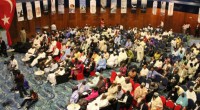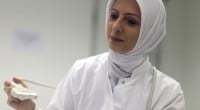Gülen sees peace wherever Huntington sees clash

Date posted: October 30, 2007
ALİ İHSAN AYDIN
On the last day of a conference titled “The Changing Islamic World: Contributions of the Fethullah Gülen Movement” held in London, Gülen’s interfaith and inter-cultural dialogue activities were discussed.
During the discussions, it was strongly stressed that Gülen opposed the “clash of civilizations” thesis through dialogue endeavors launched years ago. American academic Richard Penaskovic, who presented a paper titled “Gülen’s Response to the Clash of Civilizations Thesis” at the session on coexistence and dialogue of the conference held at the prestigious London School of Economics, said Gülen responded to the thesis with tolerance, interfaith dialogue and love. Noting that Huntington and Gülen have very different understandings of the future, Penaskovic observed: “Gülen sees peace wherever Huntington sees clash. Gülen talks about hopes and optimism where Huntington is persistently pessimistic about relations between Islam and West.”
The American researcher, who drew attention to Gülen’s emphasis on education and knowledge, expressed his belief that Gülen also maintained a strong distinction between knowledge and power, hoping that the future would be designed based on knowledge. An academic from Auburn University in Alabama, Penaskovic said: “Gülen’s belief may be compared to a colorless, odorless and tasteless glass of water. It becomes a prism catching and reflecting all beauties and mysteries in daylight. The truth does not change; yet, the image of the truth changes depending on our location and perspective.”
Researcher Douglas Pratt from New Zealand described Gülen as a dialogue champion in his paper titled “Islamic Approaches to Interfaith Dialogue: Gülen’s Contributions” where he analyzed the dialogue activities of the Gülen movement. Noting that dialogue was at the very center of Islamic faith and that Gülen attached great importance to this central concept, Pratt also said that non-Muslims were able to appreciate the fact that values like tolerance and love were actually Islamic through the dialogue proposed by Gülen.
‘Devoted teachers’
British researcher Ian Williams, in a paper on schools in Turkey and Great Britain, drew attention to the teachers at the schools sponsored by Gülen. Noting that the Gülen movement viewed teaching as a spiritual activity, Williams also said that the teachers at these schools were committed to their profession. Admiring their devotion to teaching, Williams also said he regretted that this was not achieved at other British schools despite intense efforts. An academic at the faculty of education at the Central England University, Williams disagreed with criticisms alleging that the schools sponsored by the Gülen movement were elitist enterprises established mainly for the rich, further stressing that these schools were based on meritocracy, a system that promotes rewards and advancement based on individual merit rather than class or social standing.
Helen Rose Ebaugh from Houston University responded to a question on the financial resources of the movement and its schools, saying that the answer should be sought in the Turks’ culture of giving and charity. Adding that it is impossible to calculate the magnitude of the movement’s financial resources because its activities are not funded by a specific center, the American academic said, “The answer is the philosophy of giving without expecting anything in return.”
The participating academics and journalists were hosted at a dinner at the Wisdom School in North London. The school, which offers educational activities in a historical building from the Victorian Era, has 35 students. The academics were informed about the school’s educational activities by the school principal and other representatives.
British researcher Ian Williams, in a paper on the schools in Turkey and Great Britain, drew attention to the teachers at the schools sponsored by Gülen. Noting that the Gülen movement viewed teaching as a spiritual activity, Williams also said that the teachers at these schools were committed to their profession. Admiring their devotion to teaching, Williams also said he regretted that this was not achieved at other British schools despite intense efforts.
Source: Today's Zaman , October 29, 2007
Tags: Conferences on Gulen | Europe | United Kingdom |
























